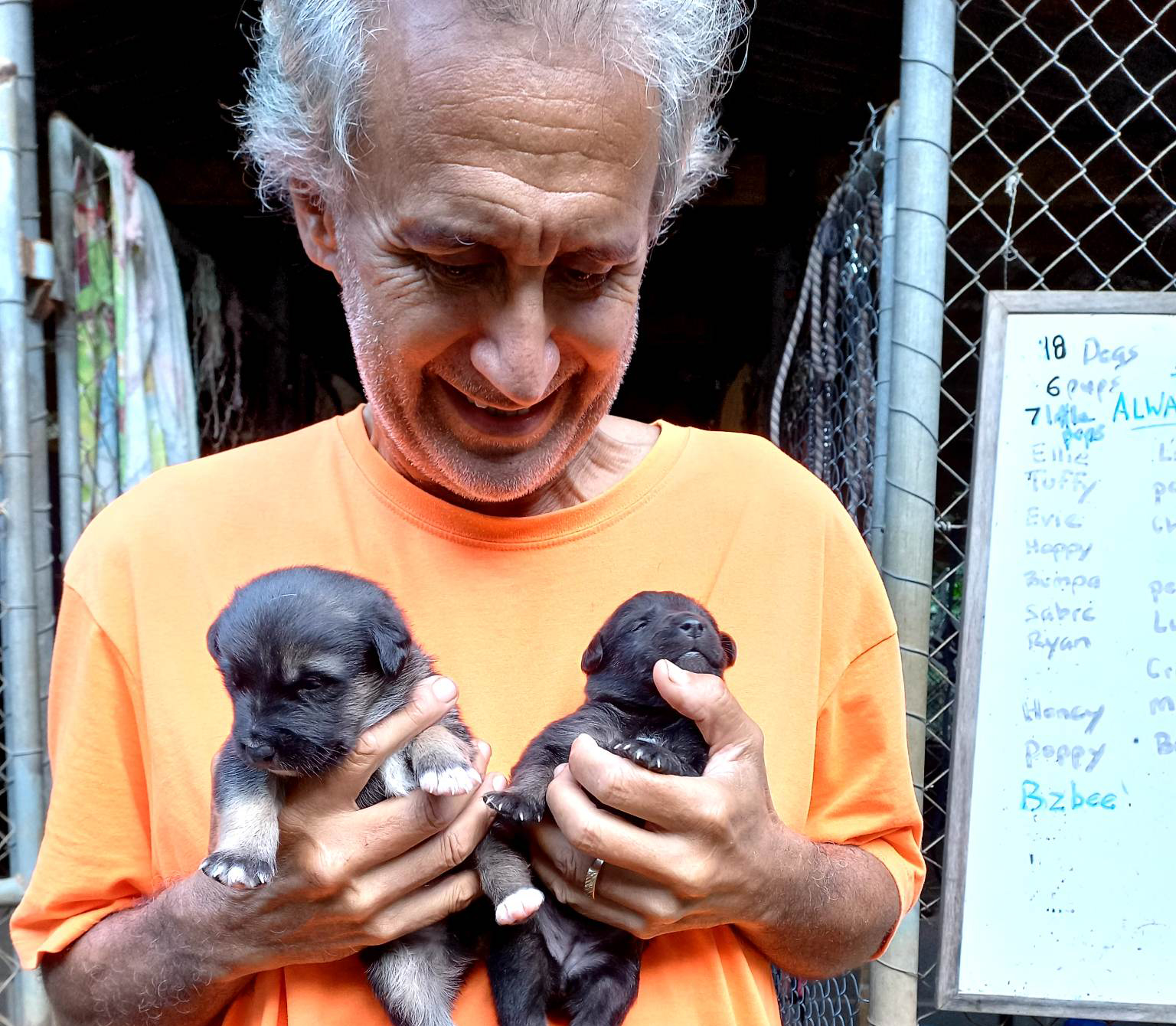SPCA’s Volunteer house in line for an upgrade
Saturday 18 March 2023 | Written by Joanne Holden | Published in Local, National

Cook Islands SPCA president and shelter manager David Pokia with newborn puppies. SUPPLIED/23022322
The number of dogs residing at the Cook Islands SPCA shelter has nearly tripled in less than two years, while staff numbers are unchanged. Now, the organisation is turning to fixing up its volunteer house to attract more help.
SPCA president and shelter manager David Pokia starts his mornings with a stroll to Papua Vai Marere (Wigmore’s Waterfall) in Vaimaanga – an excitable mass of 32 dogs following him up the hill.
“When I first started here about 21 months ago, we only had 12 dogs and that was considered quite a lot,” Pokia says.
“We’ve got 20 more than that right now, and I think I’ve got another half-dozen at home. So our numbers have increased, but our staff hasn’t.”
Pokia says the SPCA is in discussions with Cook Islands Tourism for a one-off donation to help restore the overgrown volunteer house overlooking the shelter and make running the shelter more sustainable.
The organisation’s website says the cost of upgrading the volunteer house is about $20,000.
Meanwhile, it would cost about $40,000 to connect both the house and the shelter to electricity.
“We invest once in a little house up top and we’ll be able to have people stay for one, two, three months at a time,” Pokia says.
“They can help out here (at the shelter), which means I can help out with desexing dogs and dealing with our overpopulation problem.
“A one-off investment is better than asking Tourism, ‘Can you pay for a couple of workers, and then do that forever?’ It would be too hard. Tourism is trying to be fair in spreading the love. There’s too many organisations on the island that need the help.”
Pokia says the SPCA runs mainly on donations, especially from tourists.
“Some people come here, they fall in love with our dogs, and they become ongoing helpers.
“I’ve got a lady who shipped a dog to New Zealand six weeks ago. She went from Papamoa Beach, to Sydney, to Maui, and in amongst those travels she visited a local vet. That local vet donated a bunch of flea and worming treatment to us, and got it shipped here.
“We want to keep those relationships going.”
Another dog is lined up to be adopted overseas as well.
“Someone came visiting us during the day and let him out. He found his way to Moana Sands, and he spent the week with the family. Well, they fell in love with him.”
Pokia says “tapping into people offshore” is the best long-term route for the organisation, as it means not taking money away from other causes around the Cook Islands.
However, the summer months are “a quiet time of the year for us” with “not a lot of visitors”, Pokia says.
The SPCA receives donations in the form of treatments, pet food, kennels, and money for particular projects.
“A lot of people overseas are wanting to help, but they need direction as to where the money is going, and I’ll never take somebody’s money unless we know exactly where it’s going,” Pokia says.
“We’re lucky that, a little over a year or so ago, we had some fencing that was mostly donated to us. Then, we got some more funding from the New Zealand High Commission and a couple of Kiwi kids raised some money to do our puppy enclosure. We also got some new beds with the help of some people in New Zealand.
“Really, it’s just as important for people to come and spend time with the dogs.”
Pokia says volunteers contributed to the shelter by walking the dogs, feeding them, and lighting coils to keep the mosquitoes at bay.
“We do have issues with heartworm on the island. It can transfer from one dog to another via mosquito bite. It’s something we don’t have in New Zealand. If a dog goes from here to NZ, it needs to be tested first.”
Pokia says the organisation is also working closely with Cook Islands Tourism to ramp up the island’s desexing programme, which is carried out in partnership with Te Are Manu Veterinary Clinic.
“Up top, we’ve got a fenced area that will eventually be for roaming dogs who we’ll pick up, desex, and then it’ll be catch-and-release – unless we can find their home. They may have just got lost, that happens.
“Desexed and micro-chipped dogs will have a stamp in their right ear.”
The Cook Islands SPCA was established in 1997, while the shelter was built in 2015.












































